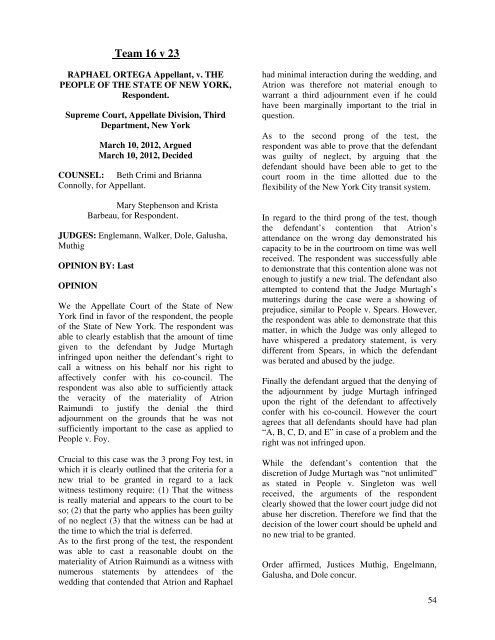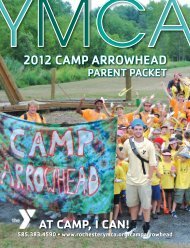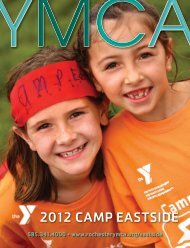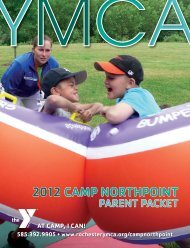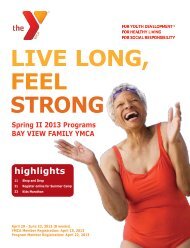2012 Conference Executive Record Report.pdf - YMCA of Greater ...
2012 Conference Executive Record Report.pdf - YMCA of Greater ...
2012 Conference Executive Record Report.pdf - YMCA of Greater ...
Create successful ePaper yourself
Turn your PDF publications into a flip-book with our unique Google optimized e-Paper software.
Team 16 v 23<br />
RAPHAEL ORTEGA Appellant, v. THE<br />
PEOPLE OF THE STATE OF NEW YORK,<br />
Respondent.<br />
Supreme Court, Appellate Division, Third<br />
Department, New York<br />
March 10, <strong>2012</strong>, Argued<br />
March 10, <strong>2012</strong>, Decided<br />
COUNSEL: Beth Crimi and Brianna<br />
Connolly, for Appellant.<br />
Mary Stephenson and Krista<br />
Barbeau, for Respondent.<br />
JUDGES: Englemann, Walker, Dole, Galusha,<br />
Muthig<br />
OPINION BY: Last<br />
OPINION<br />
We the Appellate Court <strong>of</strong> the State <strong>of</strong> New<br />
York find in favor <strong>of</strong> the respondent, the people<br />
<strong>of</strong> the State <strong>of</strong> New York. The respondent was<br />
able to clearly establish that the amount <strong>of</strong> time<br />
given to the defendant by Judge Murtagh<br />
infringed upon neither the defendant’s right to<br />
call a witness on his behalf nor his right to<br />
affectively confer with his co-council. The<br />
respondent was also able to sufficiently attack<br />
the veracity <strong>of</strong> the materiality <strong>of</strong> Atrion<br />
Raimundi to justify the denial the third<br />
adjournment on the grounds that he was not<br />
sufficiently important to the case as applied to<br />
People v. Foy.<br />
Crucial to this case was the 3 prong Foy test, in<br />
which it is clearly outlined that the criteria for a<br />
new trial to be granted in regard to a lack<br />
witness testimony require: (1) That the witness<br />
is really material and appears to the court to be<br />
so; (2) that the party who applies has been guilty<br />
<strong>of</strong> no neglect (3) that the witness can be had at<br />
the time to which the trial is deferred.<br />
As to the first prong <strong>of</strong> the test, the respondent<br />
was able to cast a reasonable doubt on the<br />
materiality <strong>of</strong> Atrion Raimundi as a witness with<br />
numerous statements by attendees <strong>of</strong> the<br />
wedding that contended that Atrion and Raphael<br />
had minimal interaction during the wedding, and<br />
Atrion was therefore not material enough to<br />
warrant a third adjournment even if he could<br />
have been marginally important to the trial in<br />
question.<br />
As to the second prong <strong>of</strong> the test, the<br />
respondent was able to prove that the defendant<br />
was guilty <strong>of</strong> neglect, by arguing that the<br />
defendant should have been able to get to the<br />
court room in the time allotted due to the<br />
flexibility <strong>of</strong> the New York City transit system.<br />
In regard to the third prong <strong>of</strong> the test, though<br />
the defendant’s contention that Atrion’s<br />
attendance on the wrong day demonstrated his<br />
capacity to be in the courtroom on time was well<br />
received. The respondent was successfully able<br />
to demonstrate that this contention alone was not<br />
enough to justify a new trial. The defendant also<br />
attempted to contend that the Judge Murtagh’s<br />
mutterings during the case were a showing <strong>of</strong><br />
prejudice, similar to People v. Spears. However,<br />
the respondent was able to demonstrate that this<br />
matter, in which the Judge was only alleged to<br />
have whispered a predatory statement, is very<br />
different from Spears, in which the defendant<br />
was berated and abused by the judge.<br />
Finally the defendant argued that the denying <strong>of</strong><br />
the adjournment by judge Murtagh infringed<br />
upon the right <strong>of</strong> the defendant to affectively<br />
confer with his co-council. However the court<br />
agrees that all defendants should have had plan<br />
“A, B, C, D, and E” in case <strong>of</strong> a problem and the<br />
right was not infringed upon.<br />
While the defendant’s contention that the<br />
discretion <strong>of</strong> Judge Murtagh was “not unlimited”<br />
as stated in People v. Singleton was well<br />
received, the arguments <strong>of</strong> the respondent<br />
clearly showed that the lower court judge did not<br />
abuse her discretion. Therefore we find that the<br />
decision <strong>of</strong> the lower court should be upheld and<br />
no new trial to be granted.<br />
Order affirmed, Justices Muthig, Engelmann,<br />
Galusha, and Dole concur.<br />
54


